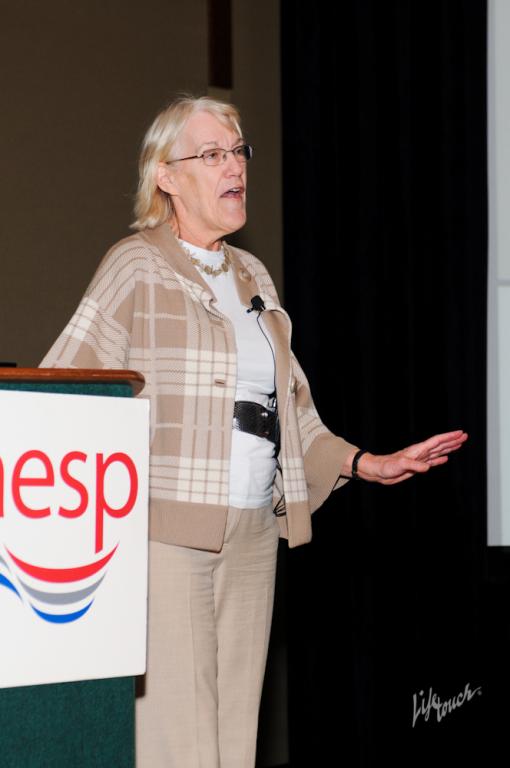Charlotte Danielson Examines Effectiveness of Teacher Evaluations
Conference News OnlineMarch 2012 Who is this creator of teacher evaluation frameworks? Many of the principals who filed into Ballroom 6A for a 12:30 p.m.
Conference News Online
March 2012
 Who is this creator of teacher evaluation frameworks? Many of the principals who filed into Ballroom 6A for a 12:30 p.m. session on Friday, March 23, were anxious to put a face to the name. The audience soon found out that Charlotte Danielson is a common sense educator who is humorous, realistic, and humble. One principal from South Dakota said, “She is real…the kind of person who should be a leader in education.” At the conclusion of her talk, she invited those with questions to come up front and join her for a discussion. She pulled up a chair and created a comfortable forum for questions and sharing of ideas.
Who is this creator of teacher evaluation frameworks? Many of the principals who filed into Ballroom 6A for a 12:30 p.m. session on Friday, March 23, were anxious to put a face to the name. The audience soon found out that Charlotte Danielson is a common sense educator who is humorous, realistic, and humble. One principal from South Dakota said, “She is real…the kind of person who should be a leader in education.” At the conclusion of her talk, she invited those with questions to come up front and join her for a discussion. She pulled up a chair and created a comfortable forum for questions and sharing of ideas.
Charlotte Danielson covered the effectiveness of teacher evaluations and used her Frameworks for Teaching as a springboard for some of the following information:
Why assess teacher performance? Assessing teacher performance is quality assurance and a fulfillment of public trust. Second, assessment promotes professional learning.
What are the challenges of teacher evaluations? First, good teaching must be clearly defined. Next, a procedure for collecting evidence must be established. And, third training of evaluators is essential for successful evaluations. The present training for Frameworks for Teaching includes 100 video clips to illustrate each component, helping evaluators be consistent in evaluation or as Charlotte stated, “sharpening the lenses of evaluation.”
What is Frameworks for Teaching? Charlotte Danielson’s evaluation tool includes four domains: planning and preparation, classroom environment, instruction, and professional development. The 2011 revision of the original 2008 Frameworks can be downloaded from her website.
What new directions does Charlotte see for Frameworks? Her thoughts about the future include further alignment with Common Core Standards, improving the instrument to be simple but powerful, and integration of student perceptions to augment the assessment of teacher performance.
What are the dangers of new trends in teacher evaluations? Many states and districts are moving too rapidly into implementation before full understanding or development of the concepts, procedures, and training, Danielson said. Premature reliance on student learning measures will contribute to ineffective evaluations. A third danger is using evaluations to only rate teachers rather than promote learning.
Charlotte Danielson offered much for both principals and legislatures to think about when evaluating teaching and learning. Her Framework for Teaching provides a method for consistency of evaluations and a way to identify professional development needs.
—Frances Yearwood, Principal, Elwood Kindle Elementary, Pitman, New Jersey

